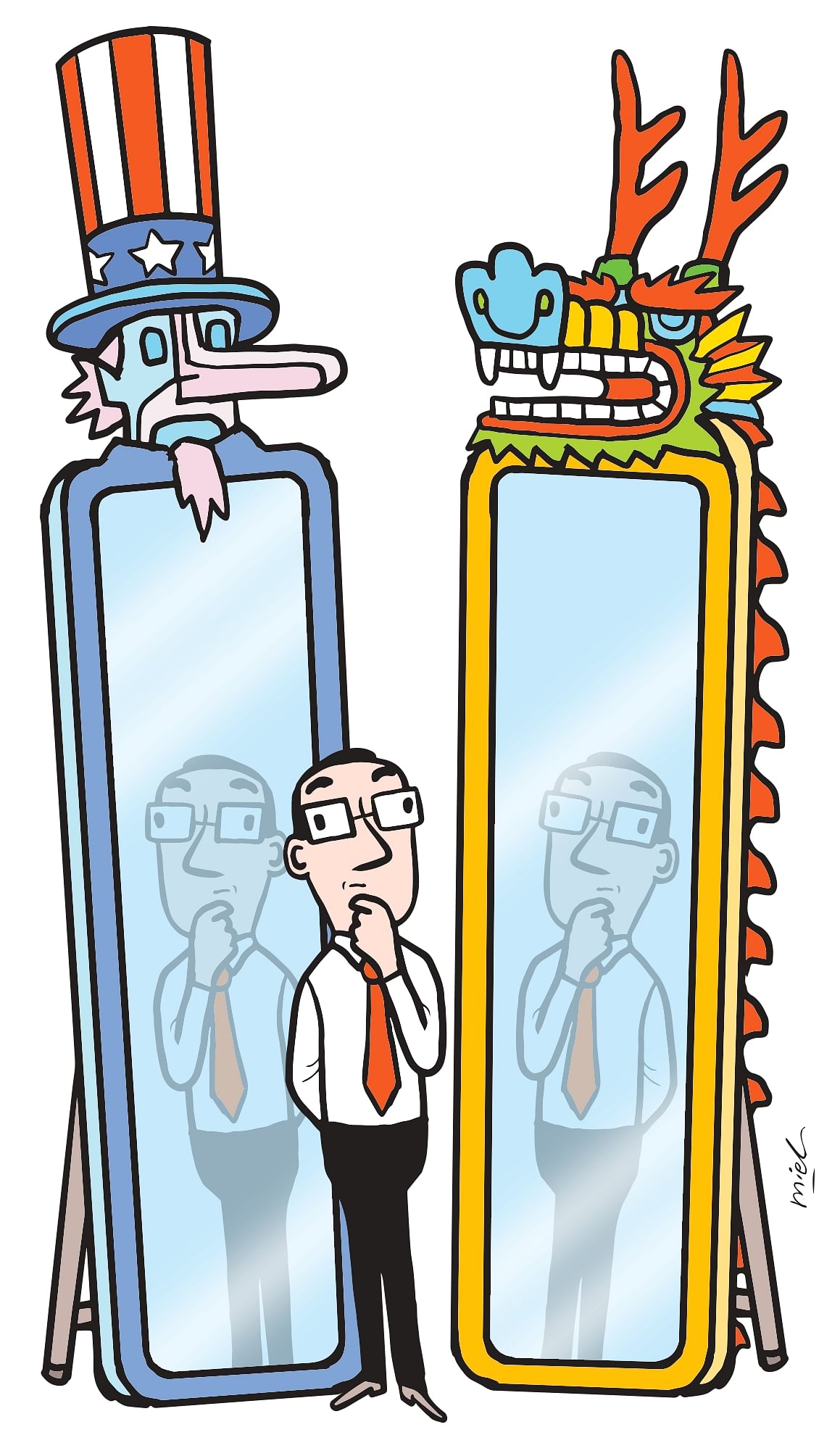Good conversations often happen in transit, and one memorable chat took place on an MTR train ride in Hong Kong some 10 years ago.
While headed back together into the city centre from a work event, a local journalist asked me: “Singapore is a largely Chinese society, so why doesn’t it side with China more – against countries like America?”
It was a question asked in all earnestness and sincerity. The journalist, who was China-born and later moved to Hong Kong, was genuinely befuddled at how Singapore charts its own path in world affairs. I look Chinese, just like him. And so do most Singaporeans. So why do we not think and act “more like China”?
Singapore – the only country outside Greater China to have an ethnic Chinese majority – appeared to him an anomaly for how it seemed to resist the pull of genealogical relations in the global arena.
I answered the best I could. Singapore does have natural ties – familial, language, cultural – with China, which enhance mutual understanding, and it is a good friend of China’s.
But its own interests must be paramount. I touched lightly on Singapore’s sovereignty, its multiracial fabric, its geographical locale in South-east Asia.
I got off the train at Admiralty station, certain that my acquaintance understood the intellectual arguments but less sure that they could overcome his emotional instinct that Singapore, with its ethnic Chinese majority, should be naturally more sympathetic to the motherland of their ancestors, whatever the merits of the case.
In the years since, I have returned to that conversation often. It and some others that follow in a similar vein are a constant reminder of how questions of identity can remain fraught in Singapore – and be even heightened in today’s world.
A troubled global situation
That casual exchange a decade ago took place at a time when regional tensions over the South China Sea were escalating. Asean nations including Singapore, which is not a claimant to the disputed territories but has a vested interest in the free flow of maritime trade, called for a code of conduct to prevent and manage conflicts. There were also differences with China over whether it should deal with each Asean claimant individually or as a bloc.
Today, there are yet more ructions across the globe. Prime Minister Lee Hsien Loong last Wednesday spent a substantial portion of his parliamentary speech during the debate on the President’s Address sketching out the lay of the land.
“The current global situation, both strategic and economic, is graver than we have experienced for a very long time,” he said. He outlined three simultaneous crises: a war in Ukraine with no end in sight; the deepening hostility between the United States and China; and protectionism threatening the multilateral trading system – the lifeblood of Singapore’s economy.
These, he said, “will set in train a whole series of changes and shocks that will severely disrupt the world, our region, and surely Singapore”.
Specifically, between the US and China, there is deep mutual suspicion and fundamental mistrust, said the Prime Minister.
Taiwan is a dangerous flashpoint, he noted. This Thursday – April 27 – marks three decades since the historic talks in Singapore between China and Taiwan that ended their deep freeze following the Chinese civil war. But the political chasm in the Taiwan Strait seems wider than ever. An alternative narrative is taking root in the West – that the situation is not just about Taiwan, but a broader ideological issue of democracy versus autocracy.
“This is even though most countries, including most Western countries, have officially adopted one-China policies. This difference of views is very worrying,” he said.
And as actions and reactions play out, “the risks of a miscalculation or mishap are growing”.
Even if a direct conflict is avoided, “enduring enmity and bad relations between them will be very costly for both, and will mean big trouble for the rest of the world”.
With countries taking sides, the free flow of trade and investments has become subject to quarrels. “Sometimes it is high-tech items like semiconductor chips or sophisticated machinery; sometimes it is agricultural products like bananas, barley or wine. They seek to inflict maximum political pain while blandly denying any hostile intent. It is a vicious cycle.”
For regular consumers, developments such as the US Congress’ grilling of TikTok chief executive Chew Shou Zi and the Senate’s move to ban the app reflect the widening ripples from the soured relationship. The latest flashpoint is Chinese fast fashion; the spotlight has now fallen on Singapore-based Chinese retailer Shein and online discount site Temu, for alleged data and business security risks, along with unfair market practices.

An insidious canker
What does all this mean for Singaporeans?
Economy-wise, high inflation due to the Ukraine war will continue to eat at household budgets, while a fractured trade system will mean slower, uncertain growth, hurting businesses and workers.
These are painful challenges that politicians, policymakers and the public alike will have to grapple with, and for which there are no easy solutions.
A more insidious canker will be the internal stresses that come from being yanked into the orbit of either superpower, with implications all round but especially for Singapore’s foreign policy, national security and multiracial relations.
PM Lee said: “Tensions between China and the US will expose our population to emotional pulls, commercial pressures, and influence campaigns, from one side or the other, to take their point of view and support their cause.”
Anecdotally, these run the gamut: from covert operations to privileged access for certain community and business leaders. There are also sustained efforts to shape the thinking of the populace – whether as fresh content or selected news clips that support a certain framing – most frequently, on social media and personal messaging platforms.
The latter is often timed for effect: For instance, clips of European Commission president Ursula von der Leyen being upbraided in December by an Irish politician for the European Union’s hypocrisy in not condemning Israel’s actions in Palestine as it did Russia’s invasion of Ukraine quickly made the rounds in some quarters here during her visit to Beijing in April. She took a harder line on China, such as on its role in Ukraine and supposedly discriminatory business practices, than French President Emmanuel Macron, who was there at the same time.
In and of themselves, individual pieces of content may not be problematic or even inaccurate, but collectively, a certain narrative is being pushed out.
To some extent, China’s influence campaign – which is the more recent one – is also an attempt to combat the prevailing Western-dominated perspective found in much of global media, popular culture and institutions. The most prominent of these in recent times are reportage on the developments leading up to Russia’s invasion of Ukraine as well as how China itself has at times been portrayed.
But the Chinese efforts are arguably more worrisome, especially in its potential ability to make headway with Chinese Singaporeans.
One misperception that China has about Singapore, writes veteran diplomat Tommy Koh in a 2016 article, is the “unreasonable expectations on the part of China towards Singapore. Many friends in China mistakenly perceive Singapore as a Chinese nation, describing us as ‘kith and kin’”.
This does not mean that all Chinese Singaporeans are susceptible to such an appeal, though a 2021 Pew survey found – unsurprisingly – that Chinese Singaporeans have a more favourable view of China than Malay and Indian Singaporeans.
What is certain is that an avalanche of narratives on either side, when consumed exclusively, gives rise to binary thinking, when the world is anything but black and white.
And thus, too often, the arguments that emerge among Singaporeans – over drinks, around dining tables, on WhatsApp group chats – are often over whether China or the US is the virtuous party in their fight.
Rarely do people speak of what is right for Singapore.
And if Singaporeans do not understand their own country’s position well, that is when its centre will not hold and the nation will be dangerously vulnerable to being pulled in all directions by external players.
What does it mean for Singapore’s foreign policy to pursue an independent course? What does it mean when it says it wants to be friends with all major powers? Is Singapore a US ally, for giving the Americans – as well as visiting forces from other countries – military access to its air and naval bases? Or is it a Chinese ally, as its top foreign investor, its major partner in government-to-government projects in China, and a supporter of the Belt and Road Initiative?
The truth is, as Prof Koh wrote, Singapore enjoys warm relations with both Washington and Beijing. And it must be in its interest that it does all of the above.
The danger is when we view our own actions through the lenses of players other than our own.


